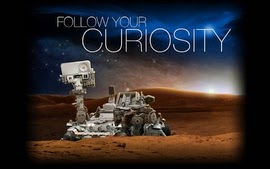It started

"From a non-linear, non-subjective viewpoint - it's more like a big ball of wibbly wobbly... time-y wimey... stuff."
"Its continuing mission: to explore strange new worlds, to seek out new life and new civilizations,
to boldly go where no one has gone before."
So that brings us to the most thought provoking question I have been asked all day. "Are comic book movies considered sci-fi?" Talk about a question to shake the foundations, right?! Well, maybe not but you can probably understand my conflict in answering that question. My immediate response was: Yessss? Wait, no. Comic book movies have clear-cut "hero's" and all the general archetypes of the Action/Adventure genre: larger than life man (yes, male hero... female superheros have yet to get their own prime time reboot), the love interest or "leading lady", badder than bad evil dude, and lots of explosions. Aside from gamma radiation, radioactive spider bites, Galactus the destroyer of worlds and the hint of the science-y in reference to the characters professions there isn't much there besides the 'fi' in sci-fi. The more appropriate term would be speculative fiction. Which, once again, is defined by dictionary.com as "a broad literary genre encompassing any fiction with supernatural, fantastical, or futuristic elements".
Matter resolved. Well... almost. When you think about it... where is the line drawn? I dearly love Star Trek and personally liked the cinematic reboot but it too was good vs. evil, a hero rising above, lots of explosions and a few ladies here and there to keep the plot interesting. Aide from taking place in space and there being more than one sentient species does that make something science fiction? Star Trek and Star Wars these two, in many opinions, fully embody what the term science fiction is all about. Yet Star Trek TOS was inspired by Westerns of that era and Star Wars was considered a "epic space opera". And with the reboots appealing largely to action movie fans due to enhanced graphics, more explosions, more fight scenes and (not so) arguably better acting where does that leave us?
 Personally, I feel sci-fi should inspire one to learn. Think back to the 1950's with all of the cult-B sci-fi/ horror flicks. Many were about chemical accidents, radioactive mutants, invaders from space and the like. They were awe inspiring, terrifying and most importantly... curious. From fear or curiosity people looked into the facts behind the myths. Were there really aliens on Mars? Could radiation really cause a lizard to become terrifyingly large and rampage the city? For some these became life long puzzles leading them to professions in the sciences. Even for the average fan shows like Star Trek and Dr. Who continually provoke questions and curiosity. So I suppose, for me, the answer is simple. Science fiction differs from action/adventure purely because of the curiosity it provokes which continually leads to inquisitive learning.
Personally, I feel sci-fi should inspire one to learn. Think back to the 1950's with all of the cult-B sci-fi/ horror flicks. Many were about chemical accidents, radioactive mutants, invaders from space and the like. They were awe inspiring, terrifying and most importantly... curious. From fear or curiosity people looked into the facts behind the myths. Were there really aliens on Mars? Could radiation really cause a lizard to become terrifyingly large and rampage the city? For some these became life long puzzles leading them to professions in the sciences. Even for the average fan shows like Star Trek and Dr. Who continually provoke questions and curiosity. So I suppose, for me, the answer is simple. Science fiction differs from action/adventure purely because of the curiosity it provokes which continually leads to inquisitive learning.Is sci-fi a sub-genre of the overarching action/adventure heading? What qualifications does any form of media need in order to fit that category? Or is there truly a difference between sci-fi and speculative fiction at this point? What do you think?
*Fun fact: The term Sci-Fi has had quite the journey. It began with an isolated use in 1851 and not heard of again until it's use as the term scientification in 1916, then science fiction in 1929 and finally the term we know and love today sci-fi was coined in 1955.


No comments:
Post a Comment